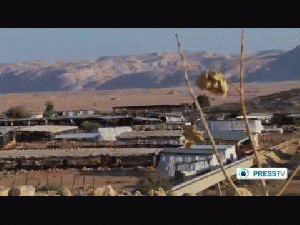Reprinted from Jonathan Cook Blog
Al-Jazeera -- 13 November 2014
The killing of a 22-year-old Arab youth by Israeli police on November 7, has highlighted tensions that have been building rapidly between the Israeli authorities and the country's 1.5 million-strong Palestinian minority.
Kheir al-Dein Hamdan's shooting in the Galilee town of Kafr Kana, near Nazareth, sparked protests in most Palestinian communities inside Israel, in some incidents turning into violent clashes with the police.
A general strike was widely observed on November 8 and simmering anger is still bringing the youth out onto the streets at night in Kafr Kana and elsewhere.
Hamdan is one of scores of Palestinian citizens of Israel who were killed by police in unexplained circumstances over the past 14 years. His death, however, has magnified a mood of intense anger and frustration among the Palestinian minority, which comprises a fifth of Israel's population.
The atmosphere was set earlier this year with a wave of violent attacks carried out by Jewish settlers targeting Palestinians in Israel, rather than Palestinians in the occupied territories, burning mosques, defacing churches and vandalising cars. Police have mostly failed to identify the culprits.
A series of events then followed, including the gruesome killing of 16-year-old Mohammed Abu Khdeir in Jerusalem at the hands of Jewish extremists in early July. Israel's war on Gaza, which left more than 2,100 Palestinians dead, most of them civilians, also incensed the Palestinian minority.
The widespread protests over the summer were marked by frequent clashes with the police reaching a level not seen since the start of the second Intifada in 2000.
Hundreds of arrestsPolice responded with hundreds of arrests, including of many children, often in heavy-handed, night-time raids on homes that have become a familiar sight in the occupied territories. Leading human rights lawyers in Israel have described Hamdan's death as a police "execution."
The intensifying efforts over the past few weeks by government officials and Jewish extremists, backed by the Israeli police, to assert greater control over the Al-Aqsa Mosque compound in occupied East Jerusalem has added another layer of distress.
Many Palestinians accuse the police of enforcing racist policies that dehumanise all Palestinians, ignore their rights and concerns, and brook no dissent, whether peaceful or violent.
For the minority, this incident was yet another graphic and shocking illustration that they are seen not as citizens but as the enemy.
Over a decade ago, that was precisely the conclusion of a state commission of inquiry into the police's killing of 13 Palestinian citizens in towns across the Galilee in October 2000, at the start of the second Intifada.
(Note: You can view every article as one long page if you sign up as an Advocate Member, or higher).






